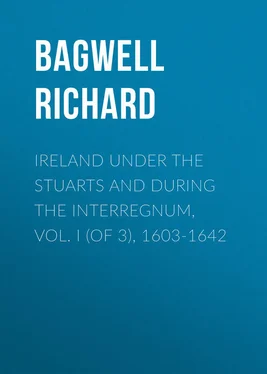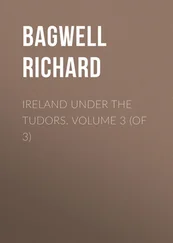Richard Bagwell - Ireland under the Stuarts and during the Interregnum, Vol. I (of 3), 1603-1642
Здесь есть возможность читать онлайн «Richard Bagwell - Ireland under the Stuarts and during the Interregnum, Vol. I (of 3), 1603-1642» — ознакомительный отрывок электронной книги совершенно бесплатно, а после прочтения отрывка купить полную версию. В некоторых случаях можно слушать аудио, скачать через торрент в формате fb2 и присутствует краткое содержание. Жанр: foreign_antique, foreign_prose, на английском языке. Описание произведения, (предисловие) а так же отзывы посетителей доступны на портале библиотеки ЛибКат.
- Название:Ireland under the Stuarts and during the Interregnum, Vol. I (of 3), 1603-1642
- Автор:
- Жанр:
- Год:неизвестен
- ISBN:нет данных
- Рейтинг книги:4 / 5. Голосов: 1
-
Избранное:Добавить в избранное
- Отзывы:
-
Ваша оценка:
- 80
- 1
- 2
- 3
- 4
- 5
Ireland under the Stuarts and during the Interregnum, Vol. I (of 3), 1603-1642: краткое содержание, описание и аннотация
Предлагаем к чтению аннотацию, описание, краткое содержание или предисловие (зависит от того, что написал сам автор книги «Ireland under the Stuarts and during the Interregnum, Vol. I (of 3), 1603-1642»). Если вы не нашли необходимую информацию о книге — напишите в комментариях, мы постараемся отыскать её.
Ireland under the Stuarts and during the Interregnum, Vol. I (of 3), 1603-1642 — читать онлайн ознакомительный отрывок
Ниже представлен текст книги, разбитый по страницам. Система сохранения места последней прочитанной страницы, позволяет с удобством читать онлайн бесплатно книгу «Ireland under the Stuarts and during the Interregnum, Vol. I (of 3), 1603-1642», без необходимости каждый раз заново искать на чём Вы остановились. Поставьте закладку, и сможете в любой момент перейти на страницу, на которой закончили чтение.
Интервал:
Закладка:
Later in the year Davies was with Lord Clanricarde at Athlone, where he held his presidential court. Clanricarde, though he had but a weak council, not only did his business very well, but kept house in a very honourable fashion. It had been reported on both sides of the Channel that Lady Clanricarde, the daughter of Walsingham, the widow of Sidney and Essex, was not satisfied with her position, but he found her ‘very well contented and every way as well served as ever he saw her in England.’ Davies was in London during part of the following year. He was on circuit as commissioner of assize in Ulster before leaving Ireland, and in the spring of 1606 after his appointment as Attorney-General he was associated with Chief Justice Walshe as circuit-judge in Munster. The arrangement was contrary to modern ideas, but no doubt it was convenient to have a judge who could draw bills of indictment himself and afterwards pronounce upon their validity. He rightly thought Munster the finest province of the four, but it had one thing in common with Ulster, and that was the readiness of the people to accept the services of the judges. The poor northern people were glad to escape from the lewd Brehons who knew no other law but the will of the chief lords, and the Munster men, though not dissatisfied with the President, felt that the local justices might have interested motives, and were ‘glad to see strangers joined with them, and seemed to like the aspect of us that were planets, as well as that of their own fixed stars.’ At Waterford, where they held their first sittings, the judges found very few prisoners that were not ‘bastard imps of the Powers and Geraldines of the Decies.’ They always had cousins on the jury, and no convictions could be had unless the evidence was absolutely clear, when threats of the Star Chamber generally produced a verdict. The ‘promiscuous generation of bastards’ he believed due to slack government both civil and ecclesiastical. They were considered just as good as the lawful children, and commonly shared the inheritance as well as the name. ‘I may truly affirm,’ he said, ‘that there are more able men of the surname of the Bourkes than of any name whatsoever in Europe.’ And so it was with all the great families, whether Anglo-Norman or Celtic. To scatter and break up these clannish combinations appeared to Davies an excellent policy. The judges slept at Dungarvan and Youghal, where they saw the chief people, dined with Lord Barrymore on their way to Cork, and found the gaols there pretty full. They lectured the chief gentry upon their addiction to ‘coshery and other Irish occupations,’ in spite of the King’s proclamation. 84 84 Davies to Salisbury, December 8, 1604 and May 4, 1606.
At Mallow Davies stayed at Lady Norris’s house ‘by a fair river in a fruitful soil, but yet much unrepaired and bearing many marks of the late rebellion.’ From Mallow the judges went by Kilmallock through ‘a sweet and fertile country to Limerick, where the walls, buildings, and anchorage were all that could be wished; yet such is the sloth of the inhabitants that all these fair structures have nothing but sluttishness and poverty within.’ They held first the assizes for Clare, of which Lord Thomond was governor. He and Lord Bourke had provided a large house on the right bank of the Shannon, so that Limerick served as quarters for both counties. In Clare, said Davies, ‘when I beheld the appearance and fashion of the people I would I had been in Ulster again, for these are as much mere Irish as they, and in their outward form not much unlike them,’ but speaking good English and understanding the proceedings well enough. He found the principal gentry civilised, but the common people behind those of Munster, though much might be hoped from Lord Thomond’s example. Having delivered the gaols, the judges considered how they might cut off Maurice McGibbon Duff and Redmond Purcell, ‘notorious thieves, or, as they term them, rebels,’ who were allied to and protected by the White Knight and by Purcell of Loughmoe in Tipperary. Purcell was enticed into a private house and given up to the Lord President, who promptly hanged him, as well as ‘many fat ones’ who sheltered Maurice McGibbon, but the latter seems to have escaped for the time, though snares were laid for him on all sides. 85 85 Davies to Salisbury, May 4, 1606; Brouncker’s letter of September 12, 1606.
From Limerick by Cashel, ‘over the most rich and delightful valley,’ the judges came to Clonmel, the capital of Ormonde’s palatinate, and ‘more haunted with Jesuits and priests’ than any place in Munster. There was evidence to show that some of them were privy to the Gunpowder Plot, and yet all the principal inhabitants refused any indulgence founded upon a promise to exclude them from their houses. A true bill for recusancy was found with some difficulty against 200 of the townsmen, and the chief of them were handed over to the Lord President ‘to be censured with good round fines and imprisonment.’ From Clonmel Davies went to rest on Easter Sunday at Ormonde’s house at Carrick-on-Suir. The old chief, who was blind and ill, insisted on his staying over St. George’s day, ‘when he was not able to sit up, but had his robes laid upon his bed, as the manner is.’ 86 86 Davies to Salisbury, May 4, 1606; Brouncker’s letter of September 12, 1606.
Конец ознакомительного фрагмента.
Текст предоставлен ООО «ЛитРес».
Прочитайте эту книгу целиком, купив полную легальную версию на ЛитРес.
Безопасно оплатить книгу можно банковской картой Visa, MasterCard, Maestro, со счета мобильного телефона, с платежного терминала, в салоне МТС или Связной, через PayPal, WebMoney, Яндекс.Деньги, QIWI Кошелек, бонусными картами или другим удобным Вам способом.
1
Lord Deputy and Council to the Privy Council, April 6; Tyrone to Cecil, April 7; submission of Tyrone, April 8; Godolphin to Carew, April 19. Farmer’s chronicle of this reign begins at p. 40 of MS. Harl. 3544 with a panegyric on ‘Elizabeth the virgin Queen and flower of Christendom that hath been feared for love and honoured for virtue, beloved of her subjects and feared of her enemies, magnified among princes and famozed through the world for justice and equity.’ Since these chapters were written Farmer’s book has been printed by Mr. Litton Falkiner in vol. xxii. of the English Historical Review .
2
In Cambrensis Eversus , published in 1662, John Lynch says ‘the Irish no longer wished to resist James (especially as they believed that he would embrace the Catholic religion), and submitted not unwillingly to his rule, as to one whom they knew to be of Irish royal blood,’ iii. 53. Lynch was a priest in 1622. Stephen Duff, Mayor of Drogheda, to the Lord Deputy and Council, April 13; Mountjoy to Cecil, April 19, 25 and 26; Francis Bryan, sovereign of Wexford, to Mountjoy, April 23. James VI. to Tyrone, December 22, 1597, in Lansdowne MSS. lxxxiv. Tyrone to James VI., April 1600 in the Elizabethan S.P. Scotland . Letters of Elizabeth and James , Camden Society, p. 141. Farmer’s Chronicle .
Читать дальшеИнтервал:
Закладка:
Похожие книги на «Ireland under the Stuarts and during the Interregnum, Vol. I (of 3), 1603-1642»
Представляем Вашему вниманию похожие книги на «Ireland under the Stuarts and during the Interregnum, Vol. I (of 3), 1603-1642» списком для выбора. Мы отобрали схожую по названию и смыслу литературу в надежде предоставить читателям больше вариантов отыскать новые, интересные, ещё непрочитанные произведения.
Обсуждение, отзывы о книге «Ireland under the Stuarts and during the Interregnum, Vol. I (of 3), 1603-1642» и просто собственные мнения читателей. Оставьте ваши комментарии, напишите, что Вы думаете о произведении, его смысле или главных героях. Укажите что конкретно понравилось, а что нет, и почему Вы так считаете.












